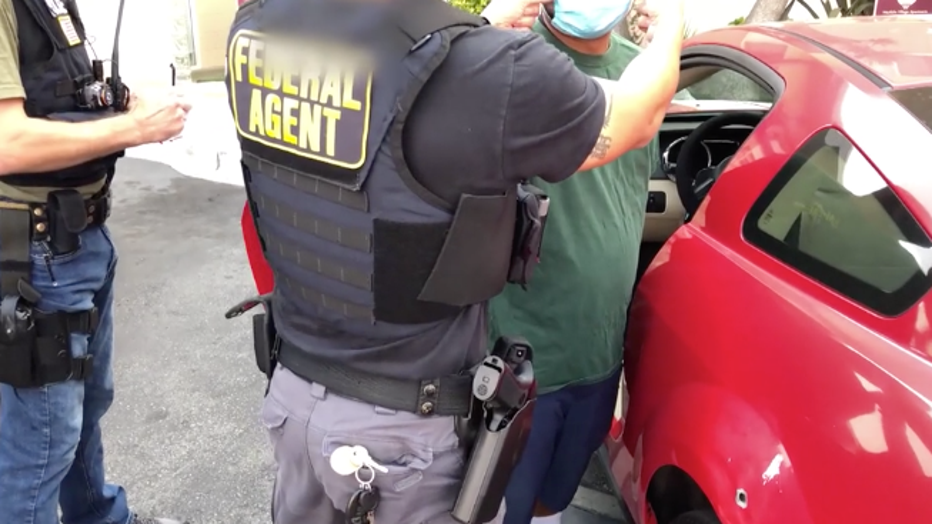Marin County Sheriff sued over sharing license data with ICE

ACLU sues Marin County Sheriff for turning over license plate camera data to ICE
KTVU FOX 2's Heather Holmes spoke with Brian Hofer, executive director of Secure Justice, to get a closer look at license plate surveillance technology -- and where the laws currently stand.
NOVATO, Calif. - Immigrant rights activists on Thursday sued the Marin County Sheriff for sharing millions of drivers’ license plates and location data with federal and out-of-state agencies in what is believed to be the first of its kind to challenge the sharing of private information collected by this type of mass surveillance.
Marin County residents Lisa Bennett, Cesar S. Lagleva and Tara Evans are alleging that Sheriff Robert Doyle is violating California's sanctuary law, SB 54, because the Automatic License Plater Reader information is available to federal immigration agents. And they are also alleging that this information is also being shared out of state, a violation of another law, SB 34.
The three plaintiffs are being represented by the ACLU Foundations of Northern California, Southern California, and San Diego & Imperial Counties, the Electronic Frontier Foundation and attorney Michael T. Risher. They said they chose Marin County first because the sheriff has a "long history of collaborating with ICE."
"The information unveiled through this lawsuit shows that the freedoms that people think they possess in Marin County are a mirage: people cannot move about freely without being surveilled," Bennett said in a statement. "Our county sheriff, who has sworn to uphold the law, is in fact violating it by sharing peoples’ private information with outside agencies."
Bennett said the sharing of information can be especially harmful for immigrants and people of color: two communities that are "traditionally the targets of excessive policing, surveillance, incarceration or deportation."

FILE ART Courtesy: ICE
MORE: Privacy advocate sues CoCo sheriff's deputies after license plate readers target his car stolen
A spokesman for the Marin County Sheriff referred all questions to the county counsel's office. They responded on Thursday, "We have not yet been served with the suit, but have now received a copy. We will review the allegations carefully and respond," County Counsel Brian Washington wrote.
Marin County is not the only department that uses these Automated License Plate Readers, which are fixed cameras on streets and police cars that capture data as cars roll by. There are dozens of cities and agencies that employ the technology, which supporters say can help capture criminals fster.
Experts say that they anticipate many more lawsuits like this to be filed.
"This lawsuit should put others on notice," said Electronic Frontier Foundation staff attorney Sara Hussain. "This practice is widespread."

BART says it was an accident that license plate reader cameras sent info to federal database
BART says it was an accident that license plate reader cameras sent info to federal database. Leigh Martinez reports
The suit alleges that the sheriff’s office shares and transfers license plate information with Immigration and Customs Enforcement, Customs and Border Protection, the Department of Homeland Security and 400 out-of-state law enforcement agencies. These agencies are then able to perform queries of a license plate against information the sheriff has collected and create their own "hot lists."
Immigrant rights activists have long feared that ICE has the ability to compile their own lists to track down undocumented people, although there is no evidence to prove this has occurred.
MORE: City of Alameda approves funding controversial license plate readers but holds off on their use
In a previous interview with KTVU, Mike Sena, executive director of NCRIC, a central repository that collects and shares license plate data among police agencies in Northern California, argued in favor of the technology.
He said the cameras can be extremely valuable in quickly tracking down a subject of an investigation.

Oakland privacy advocate sues sheriff after license plate readers target his car stolen
Brian Hofer, chair of the Oakland Privacy Advisory Commission, sued the Contra Costa County Sheriff after he said he was detained at gunpoint on Nov. 25, 2018 when license plate readers mistakenly put his rental car on a stolen hot list. The exact numbers of mistakes like the one that happened in Hofer’s case aren’t known. That’s because a 2 Investigates Public Records Request to police agencies reveal that these departments do not conduct these type of audits. Brooks Jarosz reports
And he said that as of 2017, police departments are not supposed to share information with ICE because of the state's sanctuary law.
"It’s listed on all our sites," Sena said in a previous interview. "This shall not be used for immigration purposes. It’s got to be used for some crime or criminal activity and we enumerate the types of crimes it has to involve for a person to get access to it."
However, Secure Justice Executive Director Brian Hofer said that there has never been an audit to see if law enforcement agencies have complied with this regulation.
In fact, Hofer said that BART is the only agency within the Northern California consortium to have created a firewall between the license plate information and federal agencies.

Alameda considers license plate readers
The Alameda City Council is poised to vote Tuesday night on whether to scan the license plates of every car that enters and leaves the island.
"Everyone else is just co-mingling the information together," Hofer said. "I think hundreds of agencies are violating the law, possibly out of ignorance. They just don't know how to work the software."
Hofer added: "Marin County is an easy target. But everyone is probably violating this law."

